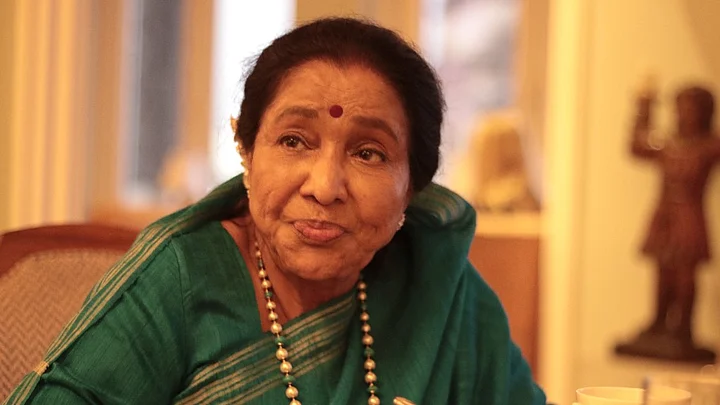Frankly, Asha Bhosle is one movie legend who has remained unaltered with time and an ever-spiralling repertoire, maintaining her status as the most recorded-artiste in the world: a fact acknowledged by the Guinness Book of World Records in 2011. No one, not even her didi Lata Mangeshkar, can beat her on that count.
After a break of over half a decade, I met her lately at an art exhibition which she was inaugurating. On sighting me in the melee, she called out, “Why’re you hiding from me? Come here!” Followed a bear hug and warm words, “When I think of someone as a friend, it’s for life. Come let’s pick up from where we left off. What’re you up to? Why have you lost weight? Must send you some crab curry…”
The paparazzi swarmed in before she could complete the sentence. The artist began to describe his canvases located on the Varanasi ghats. She sent word through her daughter-in-law Anuja, to wait, to join her for a cup of tea and paani puri, once she had completed the art walk.
The artist kept insisting that she should pick a painting which he could gift her. She responded, “No, no, artists can’t afford to hand out gifts, even paints and canvases cost so much nowadays.” The painter wouldn’t stop badgering her, she deflected him with a, “Take it easy, enjoy your moment.” It was the first time that his exhibits were being endorsed by a celebrity.
The biggest AB in my book, she’s been a constant ever since my first interview with her. “Oh,” she had sighed disappointingly. “I was told that you’re a terror but you’re a baby.” Blushing, I said it could be no other way, I was her pankha, still am.
That art whirl done, over tea at a swishy restaurant, the diva didn’t really want to talk shop, but my journalist antenna was up.
So get this: she was to travel the next day to Ahmedabad in connection with her private album of Gujarati songs, dedicated to the memory of the late lyricist-composer Avinash Vyas. “I had so many of his compositions with me. I had to pay my respects. I can sing and speak in Gujarati fluently.” Asha Bhosle has rendered songs in practically every Indian language, and in English and Russian too. What about French? “Tais toi garcon,” she laughs. Translated that means, “Keep quiet kiddo.”
The song album was to be released by the Gujarat Chief Minister. Next, she will take off to the US for a three-week-long concert of her ‘iconic songs’, this at a time when even the Khans and the Bachchans don’t attract packed houses for their overseas concert tours. “I don’t know about that,” she shrugs. “I love to rewind to songs which are precious to me. And they need not all be mine. I will be performing numbers by other singers as well.”
Lata didi’s too? “Of course!” she replies poker-faced, any sign of that age-old rivalry between the nation’s best known-sisters, avoided with a lingering sip of lopchu. Instinctively I ask her to list her most cherished songs. She frowns. Silence. Come on, just top-of-the mind-favourites, I insist. Frown deleted.
Today, her absolute favourite No. 1 is 'Do Lavzon ki Hai Yeh Kahani' composed for The Great Gambler by R D Burman. Next, she mentions O P Nayyar’s 'Aaiye Meherbaan' (Howrah Bridge), 'Jaaiye Aap Kahaan Jaayenge' (Mere Sanam) and 'Deewana Hua Baadal' (Kashmir Ki Kali). Ravi’s 'Aage Bhi Jaane Na Tu' (Waqt) and Khayyam’s 'Yeh Kya Jageh Hain Doston' (Umrao Jaan) top her charts, too.
Which song would she rate as Lata didi’s best? Without a pause, she cites 'Lag Jaa Gale' composed by Madan Mohan for the whodunnit Woh Kaun Thi.
Asha Bhosle promises to return from the US concert and resume her recordings for film songs: “Haan ab bhi producers aur directors say, didi hamaare liye ek gaana gaa dijiye (didi, do sing for us). So I do it, I have to.”
In addition, she kicked off another restaurant of Indian cuisine overseas in Manchester. Her franchise is called 'Asha’s'. The other outlets are in Birmingham, two in Dubai and Muscat.
Her son, Anand Bhosle, initiated and supervised the Asha’s chain. “Anand is the CEO of my life,” she says. “I pass everything through him for approval. Paise ke baare mein thodisi buddhu hoon. (I am a bit clueless about money matters)."
Asha Bhosle’s autobiography authored in collaboration with music scholar, the Washington-anchored Punita Bhatt, is complete, and ready to go into print.
So does she still have any unfulfilled aspirations? She doesn’t quite answer that, looks away and then at Anuja, before disclosing that she wishes to host a cookery show on a satellite TV channel.
That’s a must-do, actually. No one but no one in Bollywood maintains a better table than she has over the decades. Her recipes have been a fiercely guarded secret. So what goes into that famous crab curry, I wonder. “That’s asking,” she winds up. “The best ingredient for any curry, kabab or daal roti is to do it with love.”
(The writer is a film critic, filmmaker, theatre director and weekend painter.)
(This story is from The Quint’s archives and was first published on 8 September 2015. It is being republished to mark Asha Bhosle’s birthday.)
